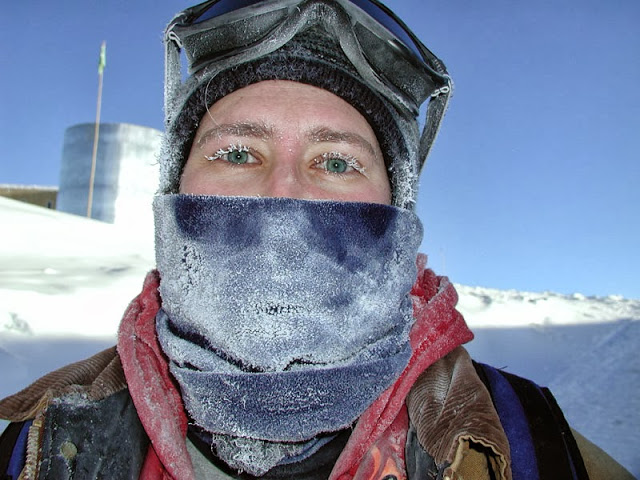Tell us a bit about yourself!
My name is
Andrea Grant. I’m 41 and have made a career of scientific instrumentation. I have degrees in physics (BS), materials science (MS), climatology (PhD), and am licensed to teach physics in Minnesota. I am the Visual Neuroimaging Technologist at the Center for Magnetic Resonance Research at the University of Minnesota; I help neuroscientists collect fMRI data on the visual system.I like to dink around with computers (building them and raspberry pis), programming, electronics, reading, baking, and fiber arts (knitting, spinning, and weaving). I grew up in Minneapolis and Portland, Oregon, and have also lived in Washington, California, New Hampshire, and Switzerland.
What brought you to the South Pole?
An LC-130 (ski-equipped C-130) Hercules transport plane! In 1997, after the end of a long relationship, I read a novel in which the main character trekked across Antarctica recreating Scott’s fatal attempt to be the first man to reach the south pole. Something lodged in my psyche and I could not get it out of my mind. In 2000, I was in the process of dropping out of grad school and happened across an ad for a field position in Antarctica. I sent in my resume, and a few months later had a job offer. I spent the summer being trained on the equipment that I would be running over the winter and deployed in October, 2000 to spend 12 months at Amundsen Scott South Pole Station.
What were the living conditions like?
The buildings were mostly normal from the inside: they were at 68F (although the floor of the ground level was typically below freezing). I slept in a 6×8′ room inside a building called a hypertat (an aluminum re-creation of a Korean War Quonset hut). The walls were more like cubicle dividers, so smells and sounds permeated everywhere.The hyperatat was about a 1/4 mile from the “dome” which was the heart of the station (an unheated geodesic dome which contained three buildings with the galley, communications, lounge/tv, offices, and berthing for about half the crew). Our bathroom for the hypertats was a few hundred feet down an unheated hallway. Temperatures in the summer (Oct-Feb) ranged from -12F to -50F, while in the winter (Feb-Oct) they ranged from -40F to -108F, so that hallway could be cold! We had running hot and cold water from large tanks of melted snow. It’s energy-expensive to melt snow, and the sewer system was limited, so we were restricted to 4 minutes of running water per week for showering (normally used twice a week for 2 minutes each) and one load of laundry.
Meals were served 3 times a day (with a fourth meal, midrats, during the summer when crews worked all three shifts). We had two cooks on the winterover crew who cooked all kinds of food. I developed a particular fondness for bacon, since it provided the most fat and calories for the least chewing. I had to eat about 4,000 calories per day to maintain body weight. It was common to plop several tablespoons of butter in a cup of hot chocolate. South pole is at about 10,000 feet, but the pressure is equivalent to about 11,000 feet, so it’s hard to get enough oxygen.
Tell us about an average day at the South Pole.
I woke up around 10 or 11 in the “morning” (we kept New Zealand time), dressed, and walked into the dome. I had a cup of coffee and headed to one of my offices to change the paper on the seismograph which had to be done at 0GMT (noon local time). Sometimes I would have lunch, other days I would just eat something like Oreos or leftovers. Then I would head up to my other office, which housed 4 other experiments I was responsible for; this was located on the top (4th) foor of a nearby building. I checked all the instruments, made daily reports, and fixed or adjusted anything that needed it. Some days I would walk a mile out to the site of the 6th experiment I maintained. I would eat dinner when it was served and then often watch a movie after dinner before heading back to bed after midnight.
How many people lived at your station? What were they like?
There were about 220 people there during the summer, when there are flights in and out 6 days per week. In the winter (Feb 15-Oct 23), there are no flights at all; my winter, we had a crew of 50 in a station built to house about 20. Over half of the crew were construction personnel there to build the new station. The next biggest group were “support” personnel who kept the station running: cooks, power plant mechanic (heat and electricity), the doctor, large and small equipment repair people. Finally there were about 10 full time scientists there conducting research. The station is there entirely for scientific research, but requires a huge infrastructure to support any life.
The best thing about wintering over was the people, and the worst thing about wintering over was the people. Just the sound of some peoples’ voices drove me nuts, but other people I got to know better than family. They saw every side of me, every foul mood and stupid mistake and lame joke, and they still loved me. The people are a bit odd. You have to wonder, who wants to spend a year in Antarctica? Who is ABLE to spend a year there? Unattached, drifters, serial ex-pats or overseas contract workers, recently divorced midlife crisis.
What did you do to amuse yourself when you weren’t working?
I read books, watched movies (no tv access), and I worked on my master’s thesis. I spent a lot of time hanging out in the galley talking to friends and drinking hot chocolate!
How much money did you earn while you worked there?
My salary was about $50k for the year. I was able to pay off some debt, travel for 3 months, and live off the rest for another year. The kicker is that most people are too fried (emotionally) to work right when they get back, so earning and saving money mostly just buys you time to recover rather than letting you “get ahead”!
What were the biggest challenges of living there? The biggest benefits?
There’s a kind of terrible monotony to being down there: you have the same conversations over and over to the point where you want to scream. The people who drove me nuts REALLY drove me nuts, and I couldn’t get away from them. Being dumped and then having to see that person at every meal really chapped (dating in general was a minefield!).
I loved the 6 months of darkness, seeing the Aurora and stars all the time. I got to know all the dark corners of my mind, which was tough at the time but in the end has freed me from a lot of old bad habits and wrong perspectives. I have friends who know everything there is to know about me!
Do you think you’ll ever go back?
Nope. I have some health issues that would probably disqualify me.
Who would be a good fit to work at the South Pole? What advice would you give to someone who’s interested in working there?
Anyone who likes live-work situations, where there is absolutely no privacy. It’s definitely a place to test yourself: it’s an endurance event to winterover, and there’s no backing out once the last flight of the summer leaves.It’s also an awesome crazy adventure that not many people can claim (around 1000 people have wintered over since the station opened in 1957). Jobs are very hard to get: there were about 500 applicants for my position. Most people start as a “general assistant” (unskilled labor) which requires someone in pretty good shape (shoveling snow for 9 hours a day at 11,000 feet is hard work) and then return the next season as something a bit less miserable. Support personnel are all hired through the NSF contractor who runs the station: Lockheed Martin currently has the contract and Bill Spindler has a nice roundup of job listings
here.
Thanks so much for sharing your story, Andrea! Have any of you guys ever been to Antarctica? Would you consider going?














That is super cool! Considering I've been really complaining about the 9" of snow and -8*F here, I'm sure I wouldn't keep sane at the South Pole.
So interesting! Thank you!
This is a great interview. My husband and I just watched a speical on NOVA on the scientist who work in Antartica and I must say I am a very jealous person right now. So many thoughts and questions. Did you get to "travel" around to any areas that were in your immediate work area? Do penguins actually come up to the buildings?
So cool! I don't think I'd ever be able to do this, but what an experience!
I don't think I could ever live with 6 months of darkness, but hearing Andrea's perspective about seeing the stars all the time is a great way to think about it!
Just got back from Antarctica last week and all I can say is that I can't WAIT to go back! I had been looking at job opportunities there before I left on my trip, but now that I've been there I have been hooked.
Whoa! JEALOUS.
It's freaking ridiculous. We saw every type of penguin except emperors. If you are ever able to save up and get there, DO IT. And stay as long as you can to get the full experience. I was on a small expedition ship with 118 other passengers for 19 days and it was not enough to truly see everything.
This is def one of the best true story interviews – what an amazing experience. The details are truly fascinating – 4 minutes of showering per week? Insane!
Right? And the bacon?! FASCINATING.
I am so fascinated by this!! Just read Where'd You Go Bernadette and the bits about the South Pole had me looking up job listings myself!! Of course, hard to do with a family! Mad props to you Andrea!!
Love this! In 2010, I was a volunteer at the American Museum of Natural History (the one with the dinos in NYC) and I worked in their Scott/Amundsen exhibit. I had to learn so much about Antarctic history, it was really amazing. To just pack up and go what might as well have been the moon with no real idea of what you'd fine takes a special kind of bravery. Since working the exhibit, I've wanted to go.
Thanks for the interview!
Oh man, I've always wanted to go to Antarctica!
I used to work on a program that did a lot of work on Erebus and in the Dry Valleys….every single one of my students got go but I never did (I had to stay home and write the grant proposals!). Sad trombone.
One day 🙂
It's kind of my husband's dream to go somewhere like Alaska, but the kinds of jobs there don't really mesh well with him!
For the past few years I've been considering taking a job in Antarctica. I think it sounds like an adventure. REALLY enjoyed this True Story!
I love this interview! I'm very interested in a stint down there. The ultimate adventure! For anyone interested, there is also a grant program offered for artists and writers. Dream big!
How interesting! I would love to visit Antarctica but I can't imagine wintering over at the South Pole, although the stars and the Northern Lights sound beautiful.
Fascinating!! I've always been curious about Antarctica and what life would be like there. Thanks for sharing your life with us!